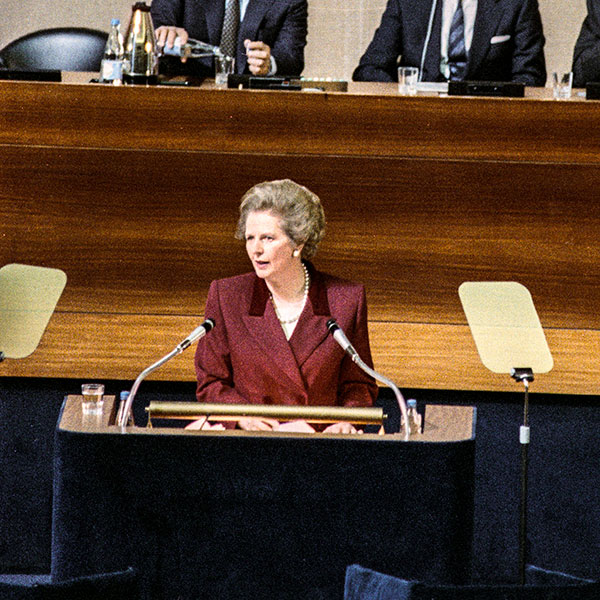DEBATE
Should governments appoint university managers?
When the government rejects a university’s candidate for rector, is it legitimate oversight or interventionism?

Photo: zVg

Photo: zVg
Universities should not be disconnected from their political supervisory authority, and that’s not that same as impeding their academic freedom.
It goes without saying that universities and colleges are essential to our country’s education, dissemination of knowledge and influence. In addition to being fundamental institutions for our cohesion and prosperity, they occupy lofty positions in international academic rankings, particularly in scientific fields, each cultivating its own specific characteristics. With the growth in the number of students, Swiss universities have become real communities. At the University of Geneva, for example, 25,000 people work, teach or study, which requires diligent organisation and management of the institution to prevent problems with finances, human resources and communication and to keep up with the vigorous social debates that regularly breathe fresh life into the university.
The absolute respect of academic freedom is intrinsic to our universities. Acquiring, developing and transmitting knowledge through research, teaching, study, debate, production, creation or publication are accordingly the missions of the academic world. This freedom must imply the autonomy of the universities. However, this autonomy is not synonymous with independence. The university is part of a geographical, administrative and political reality. As such, the political supervisory authority must be able to define the framework of this autonomy, through a law or statutes. This political supervision is also reflected in the approval of financial statements and management reports. If the choice of a rector is in principle left to the university’s governing bodies, it is in my opinion important that the local government can intervene by invalidating a choice it deems contrary to the interests of the university. The State Council is responsible for supervising all the entities that depend on the state, and it must be able to exercise this supervision in exceptional cases, including when it comes to the appointment of rectors.
Alexandre de Senarclens is a partner in a law firm in Geneva. He has been a Liberal-Radical Party member of the Grand Council of Geneva since 2015.
External involvement in the university’s appointment of managers reflects an outdated perspective on accountability mechanisms. The accountability of universities towards public authorities and wider society is taking increasingly diverse forms, particularly as missions assigned to institutions grow.
Across Europe, higher education institutions select their executive leader in different ways, but, whether through election or appointment, it’s always an internal procedure. Sometimes, the selection of the dean may have to be validated by an external authority. This process is essentially a formality, and cases of rejection by a ministry remain the exception. Importantly, changes in the last few years point to less involvement by public authorities in selecting university leaders, up to a point where there is no involvement at all, as this is considered to be interventionism.
The relationship between universities and governments – the regulators and funders of public higher education – is as crucial as it is multifaceted. There is growing recognition that universities are important contributors to policy objectives, societal and economic progress. On the one hand, public authorities can resort to a diverse set of tools to steer the sector towards the completion of these goals. On the other hand, the mandate of a rector should find its legitimacy in the choice made by the university community. This is part of a wider set of parameters that enable universities to act as strategic actors, rather than public policy vehicles.
It then becomes highly relevant to engage in an in-depth reflection on university governance models to ensure that their design adequately caters to the diverse interests and facets of the university community and its ecosystem. Across Europe, it is somewhat common for public authorities to play a role in proposing or appointing some of the members of these governing bodies. This can be considered a legitimate form of involvement. But the choice of its leader is the university’s own matter; anything else would reflect an obsolete form of government paternalism.
As Deputy Director for governance, funding and public policy development at the European University Association, Enora Bennetot Pruvot is responsible for implementing EUA policy on university funding and governance.

Photo: zVg
Universities should not be disconnected from their political supervisory authority, and that’s not that same as impeding their academic freedom.
It goes without saying that universities and colleges are essential to our country’s education, dissemination of knowledge and influence. In addition to being fundamental institutions for our cohesion and prosperity, they occupy lofty positions in international academic rankings, particularly in scientific fields, each cultivating its own specific characteristics. With the growth in the number of students, Swiss universities have become real communities. At the University of Geneva, for example, 25,000 people work, teach or study, which requires diligent organisation and management of the institution to prevent problems with finances, human resources and communication and to keep up with the vigorous social debates that regularly breathe fresh life into the university.
The absolute respect of academic freedom is intrinsic to our universities. Acquiring, developing and transmitting knowledge through research, teaching, study, debate, production, creation or publication are accordingly the missions of the academic world. This freedom must imply the autonomy of the universities. However, this autonomy is not synonymous with independence. The university is part of a geographical, administrative and political reality. As such, the political supervisory authority must be able to define the framework of this autonomy, through a law or statutes. This political supervision is also reflected in the approval of financial statements and management reports. If the choice of a rector is in principle left to the university’s governing bodies, it is in my opinion important that the local government can intervene by invalidating a choice it deems contrary to the interests of the university. The State Council is responsible for supervising all the entities that depend on the state, and it must be able to exercise this supervision in exceptional cases, including when it comes to the appointment of rectors.
Alexandre de Senarclens is a partner in a law firm in Geneva. He has been a Liberal-Radical Party member of the Grand Council of Geneva since 2015.

Photo: zVg
External involvement in the university’s appointment of managers reflects an outdated perspective on accountability mechanisms. The accountability of universities towards public authorities and wider society is taking increasingly diverse forms, particularly as missions assigned to institutions grow.
Across Europe, higher education institutions select their executive leader in different ways, but, whether through election or appointment, it’s always an internal procedure. Sometimes, the selection of the dean may have to be validated by an external authority. This process is essentially a formality, and cases of rejection by a ministry remain the exception. Importantly, changes in the last few years point to less involvement by public authorities in selecting university leaders, up to a point where there is no involvement at all, as this is considered to be interventionism.
The relationship between universities and governments – the regulators and funders of public higher education – is as crucial as it is multifaceted. There is growing recognition that universities are important contributors to policy objectives, societal and economic progress. On the one hand, public authorities can resort to a diverse set of tools to steer the sector towards the completion of these goals. On the other hand, the dean’s mandate should find its legitimacy in the choice made by the university community. This is part of a wider set of parameters that enable universities to act as strategic actors, rather than public policy vehicles.
It then becomes highly relevant to engage in an in-depth reflection on university governance models to ensure that their design adequately caters to the diverse interests and facets of the university community and its ecosystem. Across Europe, it is somewhat common for public authorities to play a role in proposing or appointing some of the members of these governing bodies. This can be considered a legitimate form of involvement. But the choice of its leader is the university’s own matter; anything else would reflect an obsolete form of government paternalism.
As Deputy Director for governance, funding and public policy development at the European University Association, Enora Bennetot Pruvot is responsible for implementing EUA policy on university funding and governance.




